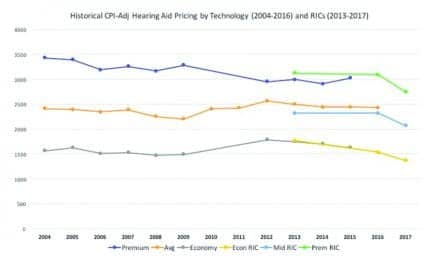Although The Hearing Review, a trade publication unaffiliated with any of the hearing-related professional associations, has been respectfully asked not to attend the major organizational business/member meetings during the past several years, the age of social media made the AAA Academy Membership Meeting in Nashville on April 19 “open to the public,” with a live feed on Thursday morning provided by Amit Gosalia, AuD, who maintains the Facebook page, Audiology Happy Hour.
Two facts were evident from Dr Gosalia’s video: 1) There was a surprisingly small turnout for such an important meeting during a time of substantial industry change and market disruption, and 2) The disappointment of those members who were in attendance regarding the AAA Board of Directors’ decision not to endorse the Audiology Patient Choice Act which was introduced by US Senators Elizabeth Warren (D-Mass) and Rand Paul (R-Ky) in late-March of this year.
The purpose of the Audiology Patient Choice Act, according to the bill’s authors, is to allow audiologists direct provision of all services already covered by Medicare that are within audiologists’ scope of practice, allow Medicare reimbursement for auditory rehabilitation services, and give audiologists the same limited license practitioner (LLP) status accorded by Medicare as other healthcare providers such as dentists, podiatrists, chiropractors, and optometrists. Referred to in the past as the “direct access bill,” the legislation is identical to the previous bill introduced by Congressmen Tom Rice (R-SC), Matt Cartwright (D-Pa), and Lynn Jenkins (R-Kan) in May 2017, and to the July 2014 bill that was a central part of the Academy of Doctors of Audiology (ADA) 18×18 Initiative that began in 2013. The original “direct access bills” go back to 2007. The current bill has the support of ADA and the Hearing Loss Association of America (HLAA).
The bill sounds good to most audiologists. However, the “direct access” bills have had a well-documented history of controversy since at least 2011, not to mention that the American Academy of Otolaryngology-Head and Neck Surgery (AAO-HNS) and the International Hearing Society (IHS) generally oppose the legislation—making it difficult for it to gain traction in Congress. In 2014, AAA ended up giving the ADA’s 18×18 initiative its support, but also pursued its own Access to Hearing Health Care Act before eventually endorsing the Audiology Patient Choice Act in May 2015. While the AAA Board of Directors agrees with most facets of the bill, it is also clearly wary of its unintended consequences. In an era when third-party managed care administrators are expanding rapidly into the hearing healthcare market and other professions are chafing over Medicare regulations and reimbursement, the Board is cautious about taking a seat in the same boat as dentists, podiatrists, and the like—a boat that often requires its crewmates to take on Medicare and Medicaid patients and follow burdensome CMS procedures and regulations, whether it’s good for a business or not.
The discussion about the bill at the Academy Membership Meeting was kicked off by Victor Bray, PhD, former dean of Salus University’s George Osborne School of Audiology. Dr Bray noted that he had performed a return-on-investment (ROI) analysis of the post-graduate healthcare professions that revealed a general parity in degree ROI (defined as cost of education divided by average earnings) between those doctorate professions which are largely classified as “LLP,” as well as masters degree professions which are largely classified as “allied health.” He said that the major outlier was audiology, which had doctoral degree costs on par with optometry and earnings on par with the allied health professions. “In my professional opinion, it is unconscionable not to address this inequity,” he said. “I ask that we either take an advocacy position supporting the Audiology Patient Choice Act and support a professional position toward Medicare recognition, direct access, reimbursement for both diagnostics and rehabilitation, and true autonomy—or return the profession to master’s degree requirement [for] the many members…”
The AAA Board agrees with most of the goals of the Audiology Patient Choice Act, which include streamlined access to audiology care for medically necessary services without a physician referral, and receiving payment for audiology’s full scope of practice (eg, cerumen removal, vestibular rehabilitation, etc). However, as Tracy Murphy, AuD, of the Board explained, the Audiology Patient Choice Act also comes with all the risks inherent in the LLP status, including CMS requirements for merit-based incentive payment system reporting which are much greater for LLPs than they have been for audiologists. Dr Murphy pointed out that AAA keynote speaker Jeff Goldsmith cautioned about opting for Evaluation & Management (E&M) documentation, as it comes with a whole set of requirements and the use of unfamiliar and costly systems. Additionally, she said there is no guarantee that having the LLP status would provide the ability to bill E&M-related codes and allow reimbursement for vital activities such as patient histories, counseling, etc. And, importantly, there is also no guarantee that audiologists would be able to opt out of Medicare insurance reimbursement, and the system is budget-neutral and rates continue to decline in value, said Murphy. Citing audiology codes being devalued in the recent past, she warned that LLP status is by no means a guarantee of reimbursement on par with other professions.
Dr Bray’s comments were supported by many members in attendance, including ADA past-presidents Kim Cavitt, AuD, David Citron III, AuD, and Brian Urban, AuD, as well as audiologists Robert DiSogra, AuD, and David Zapala, PhD. No audience member spoke against the proposed legislation. Dr Cavitt contended that, according to the final healthcare rule from the Obama administration, audiology could find itself having to comply with many of the same conditions that the Board is concerned about as early as January 1, 2019—with or without a change in status to LLP. Additionally, Cavitt said Obamacare also advocated for a universal Electronic Health Record (EHR) rule for all providers by 2021. In other words, she says the risks expressed by AAA will be present anyway, and the LLP would at least ensure that audiologists in all (not just some) states would benefit from having access to their full scope of practice. “This bill has been unchanged since it was first introduced two Congresses ago,” said Cavitt. “You supported the same bill in the previous two Congresses with unchanged language.” She made a plea for the Board to identify those things in the bill that still required compromise so that audiology could present a unified voice to Congress when advocating for this or subsequent bills. “So, please, let’s get on one page and try to compromise,” she concluded.
AAA former-president Ian Windmill, PhD, said that the Academy did offer compromise when it met with ADA leadership the day before, and that those types of discussions should ideally take place prior to the introduction of bills so all parties are “on the same page in the beginning.” Dr Windmill went on to explain that it’s difficult to predict the decisions of CMS, FDA, or FTC, and these agencies often make changes that are not in audiologists’ best interests. “We’re concerned about whether we’ve laid the groundwork to assure that the outcomes are what we really want them to be,” he explained. “The bill hasn’t changed but the environment has changed. We have a new administration, [which has] different rules and different priorities, and after the fall we might have a whole other set [of legislators with different priorities]. So we want to make sure we lay the groundwork to get what we want.”
“I don’t think that, if we keep the current model,” said Dr Citron, “where we are putting another profession in front of us as a gatekeeper and [them] controlling the destiny of hearing care, [it] could possibly make the pie any bigger. It’s going to get smaller. We have to get leaner and more efficient—and that’s not going to change whether we have limited license practitionership or not. What will change if we get limited license practitioner recognition is that we will become a recognized healthcare provider.”
Windmill reiterated that even Dr Goldsmith, a noted healthcare expert and analyst, thought it was not advisable to move forward with an LLP change in the current healthcare environment. “If it moves the profession forward, great. But we just don’t want to take the risks…” said Windmill. “We do not want unintended consequences. [Dr Bray] is absolutely correct: salaries [and educational expenses] are not aligned, but limited licensing practitioner status doesn’t guarantee that it comes in line.”
Probably as much as any other organization, AAA has made gaining direct access for Medicare patients to audiology its highest legislative priority and devoted a lot of its resources toward that goal. However, it appears (at least for now) that the AAA Board of Directors is not willing to endorse it at the risk of sacrificing greater professional autonomy and/or potentially unsustainable levels of reimbursement in the current healthcare and legislative environment.
ADA responds to AAA Membership Meeting. The Academy of Doctors of Audiology (ADA) issued a statement reiterating that it believes that constructive collaboration requires an accurate exchange of information. The ADA’s statement went on to say:
Inaccurate statements were made during the American Academy of Audiology (AAA) Membership Meeting, which may have led to confusion regarding ADA and AAA exchanges on the Audiology Patient Choice Act. ADA neither infers nor attributes any intent to these misstatements; ADA would merely like to correct the record to ensure that accurate information is disseminated.
As documented by the Facebook Live stream of the AAA Member Meeting, Dr Ian Windmill stated that AAA leadership had presented ADA with a compromise to the Audiology Patient Choice Act and asserted that AAA is waiting on ADA for a response to that proposal.
While AAA and ADA leadership had the opportunity to engage in a short, high-level, informal discussion, AAA has not provided ADA or its leaders with a formal, written legislative compromise for consideration. Should ADA receive a specific proposal requesting changes to the Audiology Patient Choice Act, ADA members will be notified.
ADA encourages thoughtful and transparent dialogue regarding the Audiology Patient Choice Act and its impact on audiology and patient care, and we appreciate the opportunity to engage all stakeholders on the impact of this important initiative.
For more on the AAA 2108 Convention, click here.






The last time ADA and HLAA joined together on legislation they pushed a bill to take audiologists out of the process of testing hearing and fitting of amplification. Putting consumers at risk and circumventing audiologists in the diagnosis and treatment of hearing loss. I understand AAA’s caution to jump on this legislation in this climate.
I would like to applaud AAA for standing for our profession and the consumers we help.